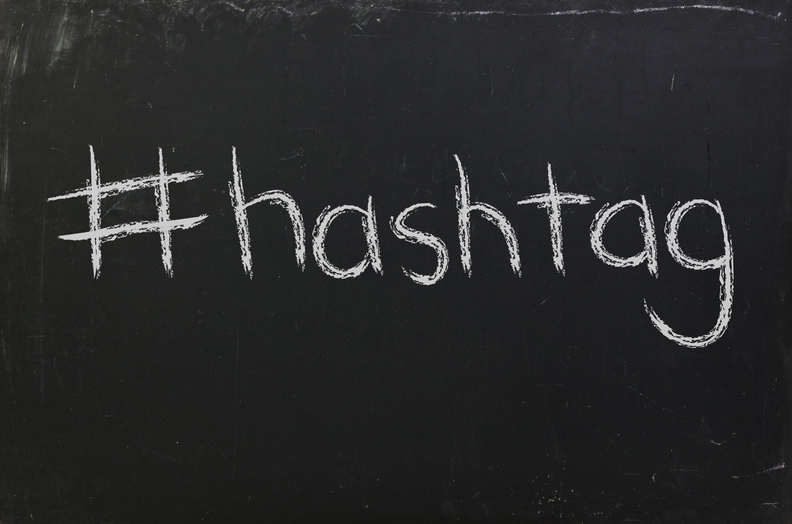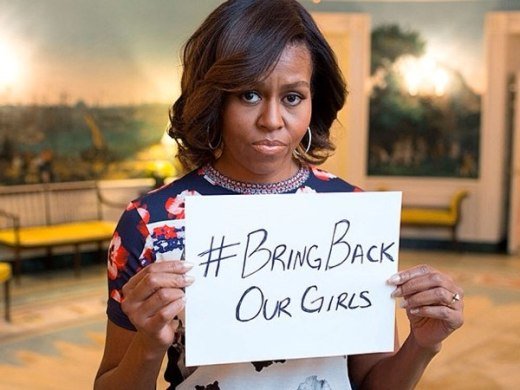A hashtag acts as an informal permission to say something in a conversation that I may not normally feel comfortable contributing to. In this way, hashtags are not only empowering, but also a critical first step that is often useful to inspire active change.
When terrorist organization, Boko Haram, kidnapped 276 female students from the Government Secondary School in the Nigerian village of Chibok, the world’s heartstrings had been tugged. All students were forced to convert to Islam and sold into marriages with members of Boko Haram for a, “bride price”, equal to $12.50. While Nigerians marched to their capital, Abuja, to demand action, the twittersphere had blown up with selfies inspired to #bringbackourgirls. Everyone from actor Gerard Butler to the First Lady of the United States joined the movement via social media. Even I hopped onto the Facebook bandwagon of awareness campaigns with the naive hope that by participating in this campaign, these girls would in fact return to their families.
More than a year later, we may reflect on the effectiveness of this online awareness campaign. Although the misfortunes of the kidnapped students did spread through the western world, the girls still remain missing. Additionally, Amnesty International estimates that there are currently over 2000 girls that have been abducted by Boko Haram. Within a few weeks after the kidnappings in Chibok, the microbloggers began to shift their focus from the campaign to their conventional, every-day, more lighthearted posts. I must admit, in a somewhat embarrassed manner, that my next few posts, shortly after the ones I had posted about the kidnappings, were in support of my favorite tennis players at the Miami Open. The aftermath of such an explosive campaign begs the question of whether hashtag movements are viable forms of activism or instead a conduit for slacktivism.
Is Hashtag Just a Hashtag?
When award-winning television producer and writer, Shonda Rhimes, expressed how ineffective she believed hashtags were to actually creating a change, she found herself in a Scandal of her own. She proclaimed to the Dartmouth Class of 2014:
Hashtags are very pretty on twitter. I love them. I will hashtag myself into next week. But a hashtag is not a movement. A hashtag does not make you Dr. King. A hashtag does not change anything. It’s a hashtag. It’s you, sitting on your butt, typing into your computer and then going back to binge watching your favorite show. For me, it’s Game of Thrones.
Rhimes then advised students to volunteer, appreciate their privilege, focus on issues beside themselves, and actively devote a portion of their life to making the world a better place.
Nevertheless Rhimes’s words had inadvertently caused a dichotomy among the masses. Critics of Rhimes’s statement claimed that hashtag activism is an extremely important tool to raise awareness to issues that deserve to be talked about. Furthermore, they claimed that hashtags have been instrumental in inspiring progress. For example, it is believed that many colleges are currently reexamining their policies with regard to sexual misconduct after certain extremely unfortunate personal accounts of misconduct were spread via Facebook and Twitter. In another example, news of Trayvon Martin’s murder successfully fueled black student organizers at the University of Michigan to campaign for racial inclusion and equity.
On the other hand, there were also many people who agreed with Rhimes’s opinion as nearly all hashtag movements have failed to produce any tangible impact. Supporters of Rhimes assert that the few hashtag campaigns that have succeeded, such as the ALS #IceBucketChallenge, are too infrequent to make the claim that the hashtags are actually doing something constructive.
Rhimes later responded to the critics claiming that her remarks were solely intended for the Dartmouth graduates:
If you were receiving the privilege of breathing the rare air that comes with getting an Ivy League degree on Sunday, I was talking to you. Hashtags are amazing for raising awareness. But I was telling them to go beyond that and do more. — Unfortunately, this did not appease the critics, but instead Rhimes was now accused of elitism.
Seek ways to actively facilitate change #DoSomething
Although the jury is still out regarding whether hashtag campaigns are truly successful, I think that Rhimes’s advice to the Dartmouth graduates, to find issues that they are passionate about and seek ways to actively facilitate change, is a great recommendation.
Does this mean that I believe that hashtags are pointless? Absolutely not”¦ with a single caveat: Hashtag activism is a powerful tool as long as the entire movement is not a hashtag.
For me, a hashtag acts as an informal permission to say something in a conversation that I may not normally feel comfortable contributing to. It may then evolve into a symbol that people can gather behind creating the chance for different opinions to be interpreted as part of a larger conversation rather than in a vacuum. In this way, hashtags are not only empowering, but also a critical first step that is often useful to inspire active change.
So for the issues that you feel truly passionate about, join the conversation using a hashtag, but after you do, don’t forget to go out of your comfort zone and actually try to #DoSomething.



















